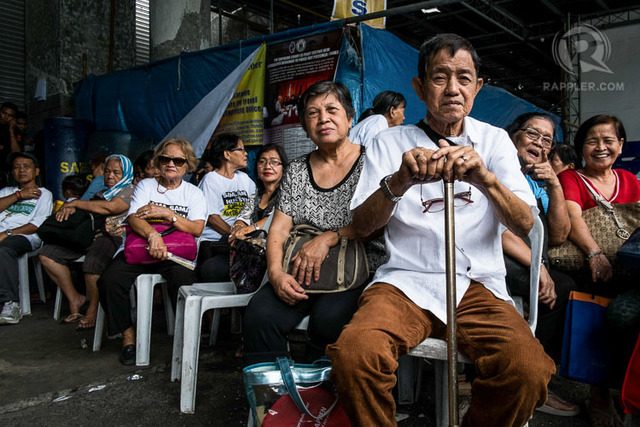SUMMARY
This is AI generated summarization, which may have errors. For context, always refer to the full article.

MANILA, Philippines – Health Secretary Francisco Duque III estimates as much as 7 million senior citizens will benefit from the newly signed Executive Order (EO) that sets a maximum drug price ceiling (MDRP) for at least 87 drug molecules, or the combination of medications within a single capsule.
In a press conference on Tuesday, February 18, Duque said Filipino elderly taking medicines covered by President Rodrigo Duterte’s EO 104 will be able to enjoy the lower prices on top of their existing senior citizen discount.
“Pagpalagay mo na 7% of the total population account for senior citizens. So that will be about 7 million of our 100 plus million population. So ‘yon ‘yong impact [na] immediate sa kanila, okay? On top of their senior citizen discount, mayroon pa silang MDRP na halos kalahati ang mababawas,” Duque said.
(Let’s assume 7% of the total population account for senior citizens. So that will be about 7 million of our 100 plus million population. So that’s the immediate impact on them, okay? On top of their senior citizen discount, they also have MDRP that will reduce the price by almost half.)
EO 104, signed by Duterte on Monday, February 17, imposes price regulation through a maximum retail price, a maximum wholesale price, or both on at least 86 drug molecules or 133 drug formulas.
Most of the medicines covered are for illnesses like diabetes, hypertension, cancer, and post-transplant maintenance. The EO will also lower prices of certain anti-depressants and medicines for neo-natal diseases.
Duque said the EO will also be a big help for cancer patients, whom he said spends as much as P1 million to P5 million a year for treatment and drugs.
He explained medicine prices are usually higher in the Philippines due to limited competition among companies, the high demand from patients, and the long supply chain the drugs go through before reaching the consumer.
“With the limited ability of many Filipinos to support even their basic needs, how can they even pay for expensive medications which will amount to P5 million to treat cancer? We cannot accept the sky-high prices as the norm,” said the Department of Health (DOH) chief.
“The industry and health institutions must be socially responsible and ensure that medicines are within reach of the ordinary Filipino. All of us should be sincere in providing fair and afforable access to medicines. The health of our people is primordial as ever over business interests,” he added.
Duque said the DOH has also submitted to Duterte another list of 122 medicines they hope would later be included in the EO’s coverage. (READ: Angara backs imposing price ceiling on 120 medicines)
Local pharma companies to step up if needed
Should international companies pull out due to the imposition of the MDRP, DOH Pharmaceutical Division program manager Melissa Guerrero said the local pharmaceutical industry would be able to cope with the demand.
“Babantayan natin. Pero ‘yon na nga, mayroon pong mga mechanisms sa batas na mag-po-provide ng access for those [medicines that are brought here through] importation. Nag-express din ang local pharmaceutical industry na kaya nila to take over the supply of the market kung mangyari man ‘yon,” Guerrero said.
(We will be on guard for this. But there are mechanisms in place by law that would provide access to medicines that are brought here through importation. The local pharmaceutical industry also expresses that they can take over the supply of the market if ever this happens.)
She then appealed to the Pharmaceutical and Healthcare Association of the Philippines (PHAP) – which has long been against price control on medicines – to work with the DOH to make sure Filipinos get the medicines they need.
PHAP said in statement on Monday that its members will comply with Duterte’s EO, but also called on the government to closely watch its effects in the market.
“PHAP has been consistent in its opposition to price control since global experience had shown that artificial measures result in market inefficiencies and lack of supply. If reasonable profits are not realized, pharmaceutical companies would review the sustainability of its operations in the Philippines, including the possible downsizing in the number of employees. The Philippines would also lose its attractiveness to investments,” PHAD said.
“The billions of taxes they pay would also be lost,” the association added. – Rappler.com
Add a comment
How does this make you feel?





There are no comments yet. Add your comment to start the conversation.